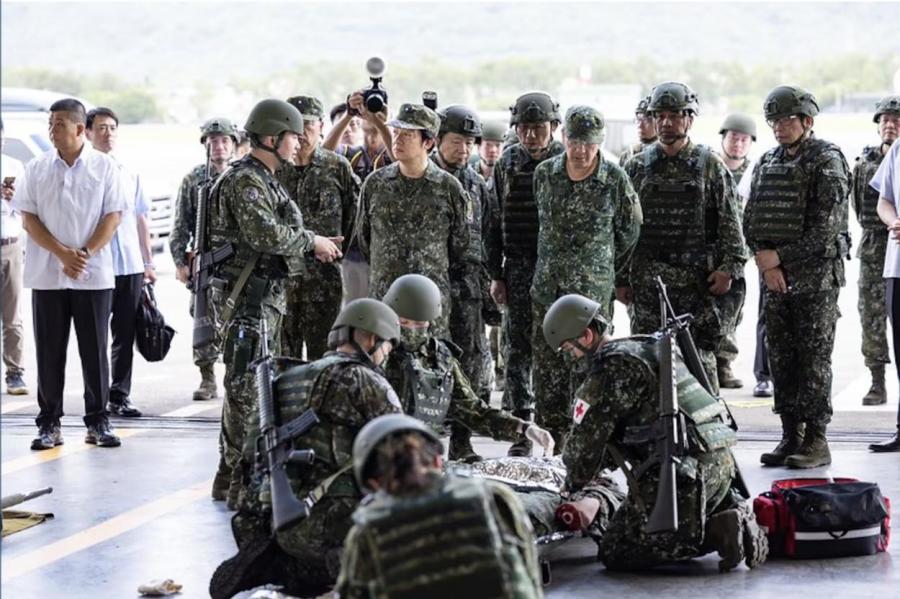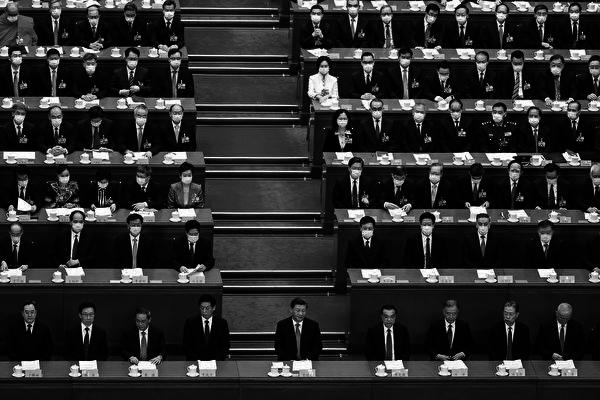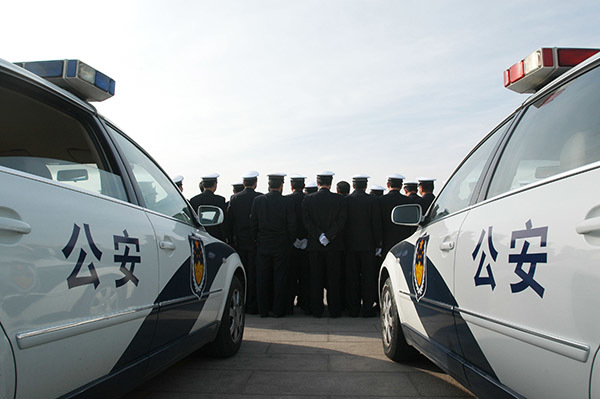Taiwanese President Lai Ching-te inspecting Air Force combat drills during last year’s Han Kuang exercise. (Taiwan Presidential Office website)
[People News] On July 1, the anniversary of the founding of the Communist Party of China, media figure Li Dayu discussed on his program how public servants within the Great Wall are risking their positions to reveal the core reason behind the CCP's fixation on unifying Taiwan: the unification of Taiwan is not about national rejuvenation; rather, Taiwan's existence undermines the legitimacy of the CCP's rule. Given that the CCP's governance lacks legitimacy, a voting election could be organised among the people of both China and Taiwan to determine which party the public supports as the ruling party and who they wish to see as their leader. The outcome hinges on Xi Jinping's perspective and whether the CCP authorities are willing to take that risk.
1. How Many Political Parties Existed When the CCP Seized Power in 1949?
The CCP has consistently claimed to be the sole ruling party. So, what was the political landscape like before and after the establishment of the nation? Our summary indicates that, aside from the CCP, there were at least 11 other political entities.
These include the Revolutionary Committee of the Chinese Kuomintang (Min'ge), the China Democratic League (Min'meng), the China Democratic National Construction Association (Min'jian), the China Association for Promoting Democracy (Min'jin), the China Peasants and Workers Democratic Party, the China Zhi Gong Party, the Jiu San Society, and the Taiwan Democratic Self-Government League, along with eight democratic parties on the mainland.
Moreover, there is the Kuomintang (led by Chiang Kai-shek), the Youth Party, and conservative organizations such as the Society of Worthies, as well as remnants of local warlords, religious groups, and ethnic factions, including the Ma family army in the northwest, Islamic forces in Xinjiang, and the Tibetan aristocracy.
Since 1949, the CCP has maintained that Taiwan is part of China, which means that there are effectively two ruling parties in China: the CCP and the Kuomintang.
2. The People's Republic of China Does Not Represent the Inheritance of Chinese National Culture.
Historian Xin Haonian stated in an interview with Voice of America that the People's Republic of China does not inherit a continuous and rich Chinese culture from the Qin, Han, Tang, Song, Ming, and Qing dynasties through to the Republic of China. Instead, it inherits what he describes as 'European Communist doctrine,' which has its origins outside of China. The ideologies of Marx, Engels, Lenin, Stalin, and Mao, which are heavily promoted by the Communist Party of China, form an imported ideology that is fundamentally at odds with traditional Chinese culture, representing two entirely different civilizational paths.
The predecessor of the People's Republic of China was known as the 'Chinese Soviet Republic,' which had already become a vassal of the former Soviet Russia prior to 1949. It was only in 1949 that it was renamed the People's Republic of China.
Thus, it can be fundamentally asserted that the Communist government has an unclear origin, being neither distinctly Chinese nor Western.
3. Changing the country name to deceive the United Nations for a legitimate seat
The Republic of China has preserved traditional Chinese culture, a fact that Mao Zedong recognised. However, Mao aspired to be the 'Emperor Taizu,' surpassing Sun Yat-sen, and ultimately decided to rename the 'Republic of China' to the 'People's Republic of China.'
According to French journalist Magali Ma's recollection, in 1965, Mao Zedong candidly admitted that he 'made a mistake' regarding one issue—'In 1949, the Republic of China should not have been renamed the People's Republic of China.' Had the name not been changed at that time, the Communist Party could have entered the United Nations sooner and would have had a legitimate status in Taiwan, among other advantages.
This assertion highlights the subsequent focal point of international controversy: the United Nations Resolution 2758, adopted in 1971, which merely confirmed that 'the People's Republic of China is the sole legitimate representative of China in the United Nations.' However, this resolution did not explicitly deny the existence of the Republic of China, nor did it address the issue of Taiwan's status. In fact, the ambiguity of this language continues to be the root of the Taiwan issue today.
4. Is there a mass base for Taiwan's unification with the mainland?
Aside from the eight democratic parties on the mainland that have been infiltrated and weakened by the Communist Party of China (CPC), there are essentially three political parties in China. Who represents China? The CPC? The Kuomintang (KMT)? The Democratic Progressive Party (DPP)? The United Nations has not issued a statement on this matter. Since the CPC came to power, it has not granted the people the right to vote, so the question of who should govern should be determined by the people.
In 2015, Wang Qishan remarked in an interview: 'The legitimacy of the Communist Party of China is rooted in history, determined by the people's will, and is ultimately the choice of the people.' The Communist Party itself understands that the legitimacy of a political party is decided by the people.
DPP Chairman Lee Teng-hui (Li Denghui) established the 'National Unification Guidelines' in 1991 as the highest directive for mainland policy. This guideline posits that Taiwan and the mainland constitute one China, with the critical issue being who governs and who rules. Is it the DPP? The KMT? The CPC? Or other new parties? The guideline advocates for elections by the people and democratic decision-making, which is why the CPC has consistently refused to acknowledge it.
5. The Taiwan government can redirect the contradictions back to the CPC.
The Taiwan government is fully capable of implementing strategic countermeasures, redirecting the contradictions of the so-called 'unification' back to the Chinese Communist Party (CCP). When the CCP loudly declares its commitment to 'unification', Taiwan can propose a national referendum, allowing both the people of Taiwan and those on the mainland to jointly decide who should govern. To ensure the fairness and security of the voting process, Taiwan could first conduct online voting in a free environment overseas, thereby avoiding the CCP's intimidation and interference with voters.
The act of voting itself is not the main issue; rather, it is significant because it rallies overseas anti-CCP activists around Taiwan's Democratic Progressive Party (DPP), enhancing international influence and prompting the United Nations to reassess the legitimacy of the CCP as China's representative. Even if this initiative fails, Taiwan would still gain another card to play against the CCP.
The CCP's greatest fear is democracy. Its high-profile 'fake attack on Taiwan' serves as a smokescreen to mask its own legitimacy crisis, creating the illusion that 'unification equates to legitimate governance'. If Taiwan can effectively leverage this situation, emphasising 'democracy and referendums', it can shift the narrative on the international stage, reclaiming moral authority and legitimacy for itself.
(First published in People News)











News magazine bootstrap themes!
I like this themes, fast loading and look profesional
Thank you Carlos!
You're welcome!
Please support me with give positive rating!
Yes Sure!